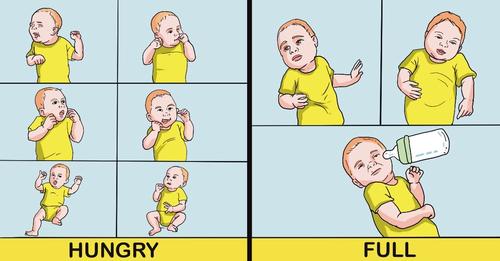
One of the biggest fears a new mother has is that her child is going hungry. And their anxiety is understandable as they are their only source of nutrition for their little ones which can be a lot of pressure, especially if they are exclusively breastfeeding. Moreover, your baby is still way too small to be able to communicate with you efficiently. So most of the time you are just guessing if they are full or not which can be stressful and frustrating. But there are some telltale signs that can help you figure out if your baby is full or hungry. Your baby may not be able to talk or even coo but they are capable of showing visible signs to express if they are hungry or not. However, it is up to you to interpret them. So what are these signs and how can you be sure that your baby is full or hungry? If you’d like these questions answered, read on!
How To Understand If A Newborn Is Hungry
Before your baby starts speaking, they will communicate using subtle cues to indicate whether they’re hungry or full. While crying is a late hunger sign, experts recommend that parents observe more subtle indications. Babies have a strong sucking reflex essential for feeding, and sticking out their tongue may be an early signal that they’re ready to eat. Typically, babies don’t immediately resort to crying when they’re hungry. Instead, they provide subtle hints for parents to pick up on. These cues may include placing their hands in their mouth, smacking their lips, moving towards the bottle or your breasts, and extending their tongue. Paying attention to these gestures is crucial, as they are your baby’s means of expressing their needs. Even a simple action like sticking out their tongue can indicate their hunger.
Here are some other signs to look out for:
- Bringing their hands to their mouth or sucking their fingers
- Turning their head in search of the breast or a bottle
- Squeezing their lips, licking or smacking them
- Clenching their hands
- Opening and closing their mouth actively
- Putting their head on the mother’s chest while being held
- Becoming unusually alert and active which can result in not sleeping for a long time
- Pulling up their legs
- Squirming around restlessly
Your baby can demonstrate either some or all of the aforementioned signs of hunger.
How To Tell If Your Baby Is Full
It is equally important to know when to stop feeding the baby. Feeding your baby excessively can lead to a plethora of problems including digestive issues. Although it is important to let your baby suck the breasts until they are full, it is equally important to notice signs that they have had enough. Here’s how to get the food coma alert. If your baby is in the process of eating or has just eaten, they may stick out their tongue to indicate that they are full and want to stop eating now. It’s part of that content food coma look that your baby gets after a nice long feeding session. But how do you distinguish between your baby being hungry and your baby being content if they employ the same gesture for both scenarios? Study their body language. If they pull away, they are full.
Here are some additional signs to be aware of:
- Your baby stops actively feeding and begins to drift away from the breast.
- They stop feeding independently and disengage from the breast.
- They turn their head away from the breast or bottle.
- Your baby starts to relax, releasing any hand tension.
- Their sucking slows down, and you sense a decrease in breast milk supply.
If you’re uncertain whether your baby has finished eating and is satisfied, attempt to burp them before presenting another breast or bottle. A contented baby will exhibit no interest in food, while a hungry one will readily accept it. This way, you can accurately determine your baby’s needs.
Forcing a child to eat is counterproductive. It may have detrimental consequences for their physical and emotional well-being. Children have a natural ability to regulate their food intake based on their hunger and fullness cues. When parents or caregivers attempt to coerce or force-feed a child, it can lead to power struggles, anxiety, and negative associations with mealtime. This can disrupt the child’s natural ability to recognize and respond to their own hunger and fullness, potentially leading to overeating or undereating in the long run.
It’s essential to create a positive and supportive mealtime environment where children can develop a healthy relationship with food, make their own food choices, and learn to listen to their bodies. Encouraging a child to try a variety of foods and respecting their appetite fosters a healthier approach to eating that will benefit them throughout their lives.
Taking after a baby is no easy task, especially during those first few months when they are fragile and wholly dependent on you. But at least now you will not have to stress about figuring out if your baby is full or still hungry. Happy parenting!


